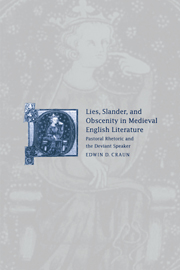 Lies, Slander and Obscenity in Medieval English Literature
Lies, Slander and Obscenity in Medieval English Literature Published online by Cambridge University Press: 31 October 2009
Piers Plowman is peopled with dozens of figures who set about catechizing and reforming the uninstructed: from Reason preaching to the whole realm at the beginning of the second dream (“wiþ a cros afore þe kyng comsede þus to techen,” B.5.12) to the friar who “gloseþ þere he shryueþ” (B.20.368) at the end of the last dream. Some of them, most notably Study rebuking Wit in passus 10 and Will addressing powerful magnates in passus 13, adopt pastoral discourse on deviant speech. Many of the folk whom they instruct or confess are given to Sins of the Tongue, especially those which assault humans (not God) with words. Backbiting, lying, chiding, false witness, murmur, sowing discord, casual swearing of oaths, idle talk, and “harlotrie” are all confessed in passus 5, under the guidance of Repentance, while Conscience fingers enough liars, flatterers, and false witnesses in the Mede episodes. Nevertheless, these speakers do not follow the exemplary mode of Genius or of the narrators of Patience and Cleanness: presenting and analyzing specific utterances in a carefully controlled way in order to modify the speech of their auditors. Furthermore, none of Will's eight dreams, with their many scenes of confession, even present a priest aiming a discourse at errant speech which is recalled and typified but not divulged, like that of Gower's lover. Not that the text refuses to voice the forbidden word: snatches of nuns' gossip, for example, surface in confession.
To save this book to your Kindle, first ensure [email protected] is added to your Approved Personal Document E-mail List under your Personal Document Settings on the Manage Your Content and Devices page of your Amazon account. Then enter the ‘name’ part of your Kindle email address below. Find out more about saving to your Kindle.
Note you can select to save to either the @free.kindle.com or @kindle.com variations. ‘@free.kindle.com’ emails are free but can only be saved to your device when it is connected to wi-fi. ‘@kindle.com’ emails can be delivered even when you are not connected to wi-fi, but note that service fees apply.
Find out more about the Kindle Personal Document Service.
To save content items to your account, please confirm that you agree to abide by our usage policies. If this is the first time you use this feature, you will be asked to authorise Cambridge Core to connect with your account. Find out more about saving content to Dropbox.
To save content items to your account, please confirm that you agree to abide by our usage policies. If this is the first time you use this feature, you will be asked to authorise Cambridge Core to connect with your account. Find out more about saving content to Google Drive.